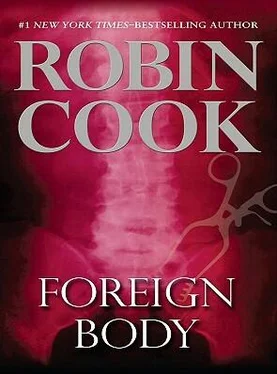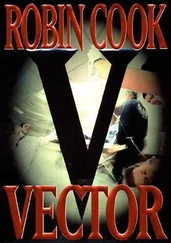The interior of the hospital was markedly over-air-conditioned, as if trying to proclaim the hospital’s luxuriousness by itself, and as modern and rich-looking as the outside. The floors were marble, the walls a highly finished light-colored hardwood, and the furniture a combination of sleek stainless steel and velvet. To the left was a smart coffee shop that could have been in a five-star Western-style hotel.
Unsure of what exactly to do, Jennifer approached the information counter, which looked more like the front desk of a Ritz-Carlton or a Four Seasons than a hospital, especially with the attractive young women dressed in impressive saris, not pink volunteer smocks. One of them had noticed Jennifer’s entrance and, as Jennifer approached, graciously asked if she could be of assistance. Knowing how the harried employees and volunteers of American hospitals acted, Jennifer was already impressed with the institution’s consumer orientation.
The second Jennifer said her name, the receptionist told her that Mrs. Kashmira Varini was expecting her, and that she would let the case manager know that Jennifer had arrived. While the receptionist made the call, Jennifer took in more of the lobby. There was even a cute bookstore and gift shop.
Within moments, Mrs. Varini appeared at the door leading into one of several offices located behind the information counter. She was dressed in a particularly eye-catching sari of exceptional fabric. Jennifer sized her up as she approached. She was slim and somewhat shorter than Jennifer’s five-six-and-a-half, although not markedly so. Her hair and eyes were all significantly darker than Jennifer’s, and she wore her hair up and clasped tightly at the back of her head with a piece of silver jewelry. Although her facial features were generally pleasant, her lips were narrow and would have appeared hard had she not been sporting a beatific smile that Jennifer would later discover to be false. Reaching Jennifer, Kashmira used the typical Indian greeting. “Namasté,” she said.
Although Jennifer felt self-conscious, she returned the greeting.
Kashmira then embarked on the usual socially acceptable questions concerning the trip and how Jennifer liked her room and the hotel, and whether the transportation had been acceptable. Even after such a quick exchange, the smile had essentially disappeared except for a few short, subsequent de rigueur bursts at appropriate junctures.
At that point Kashmira became extremely serious as she conveyed the sympathies of herself, the doctors, and, indeed, the whole hospital staff for Jennifer’s grandmother’s passing. “It was a totally unexpected tragic event,” she added.
“That it was,” Jennifer said, eyeing the woman and experiencing a reburst of the anger she’d felt that morning about the whole affair, not only losing the person closest to her in all the world but also having been dragged away from possibly one of the most important rotations in her entire medical-school career. She knew her pain-in-the-ass father was probably as guilty as anyone for the current situation, but at the moment she leveled it all at Queen Victoria Hospital in general and Kashmira Varini in particular, especially since Jennifer’s immediate impression was that she was conveying less-than-sincere sympathy to boot.
“Tell me,” Kashmira said, totally unaware of Jennifer’s sleep-deprived state of mind, “where should we go to get the unpleasant arrangements business out of the way? We can either go into the coffee shop or into my private office. It’s totally your decision.”
Taking her time, Jennifer looked beyond the information counter at the open door where Kashmira had emerged and then, turning in the opposite direction, glanced into the glass-fronted coffee shop. What made the choice was concern that if she didn’t have another cup of coffee, she might fall asleep. When Jennifer communicated her verdict to Kashmira, the case manager acted quite pleased, which was the cause of one of her brief smiles, since it suggested Jennifer would prove easy to manipulate.
Jennifer did get coffee, though it failed to have much of an impact, and she soon decided it was imperative she get back to the hotel for a nap. As a further explanation of how bad she was feeling, a quick computation told her that had she still been in L.A., she would be soon settling in for the night.
“Mrs. Varini,” Jennifer said, interrupting her host, who was describing the hospital’s lack of mortuary facilities. “I’m very sorry, but I’m finding it hard to concentrate due to lack of sleep, and I’m certainly less capable than normal to make any significant decisions. I’m afraid I’m going to have to return to my room for a few hours of rest.”
“If it’s anyone’s fault, it is mine,” Kashmira said, not particularly convincingly. “I shouldn’t have scheduled things so tightly. But we can make this short. We really only need a simple decision from you, and we can do the rest. We just need to know if you intend to embalm or cremate. Just tell us! We’ll make it happen.”
Jennifer rubbed her eyes and audibly sighed. “I could have done that from L.A.”
“Yes, you could have,” Kashmira agreed.
Jennifer opened her eyes, blinking enough to get the foreign body sensation to disappear, then regarded the expectant Mrs. Varini. “Okay, I need to see my grandmother. That’s why I came.”
“Are you certain?”
“Of course I’m certain!” Jennifer snapped before she could control herself. She hadn’t meant to be quite so demonstrable. “She’s here, isn’t she?”
“She is here for sure. I just wasn’t certain you’d want to see her. It’s been since Monday evening.”
“She’s been in a cooler, hasn’t she?”
“Yes certainly. I just thought maybe a young girl like yourself would not want—”
“I’m twenty-six and a fourth-year medical student,” Jennifer interjected irritably. “I don’t think you have to worry about my sensibilities.”
“Very well,” Kashmira said. “As soon as you finish your coffee, we’ll have you see your grandmother.”
“I’ve had enough coffee. I’m starting to get jittery.” Jennifer pushed her half-filled cup and saucer back from the edge of the table and stood up. While Kashmira did the same, Jennifer paused for a moment to let a touch of dizziness pass.
Using one of the silent, ultramodern elevators, they descended a floor to the basement level, where there were mechanical rooms, a modern staff cafeteria, a staff locker room, and various and sundry storerooms. Down the central corridor and past the cafeteria was a freight dock. A single elderly guard in an oversized uniform sat in a straight-backed chair tipped against the wall.
There were two coolers, both sited on the elevator side from the cafeteria. Without comment, Kashmira led Jennifer to the nearer one and struggled to open it. Jennifer lent a hand. It certainly wasn’t a mortuary cooler, as Kashmira had admitted. The interior was filled with shelving that ran from the floor to the ceiling along the cooler’s forty-foot length. A quick glance from Jennifer told her that it contained mostly sealed foodstuff but also some sealed medical supplies that needed refrigeration. In the center was a hospital gurney whose occupant was completely covered with a clean hospital sheet. The cooler’s smell was mildly cloying.
“There’s not a lot of space,” Kashmira said. “Perhaps you’d like to go in yourself.”
Without a word, Jennifer stepped inside. The temperature felt adequate at somewhere near freezing. Now that Jennifer was actually in her grandmother’s presence, she wasn’t so confident she actually wanted to look at her. Despite the suggestion to the contrary, Jennifer, the medical student, had never gotten accustomed to looking at dead bodies, even after she had the chance to spend a week observing in a morgue in middle school. She glanced back at the case manager, who caught Jennifer’s eyes and wrinkled her brow as if to say, Well? Are you going to look or what?
Читать дальше












